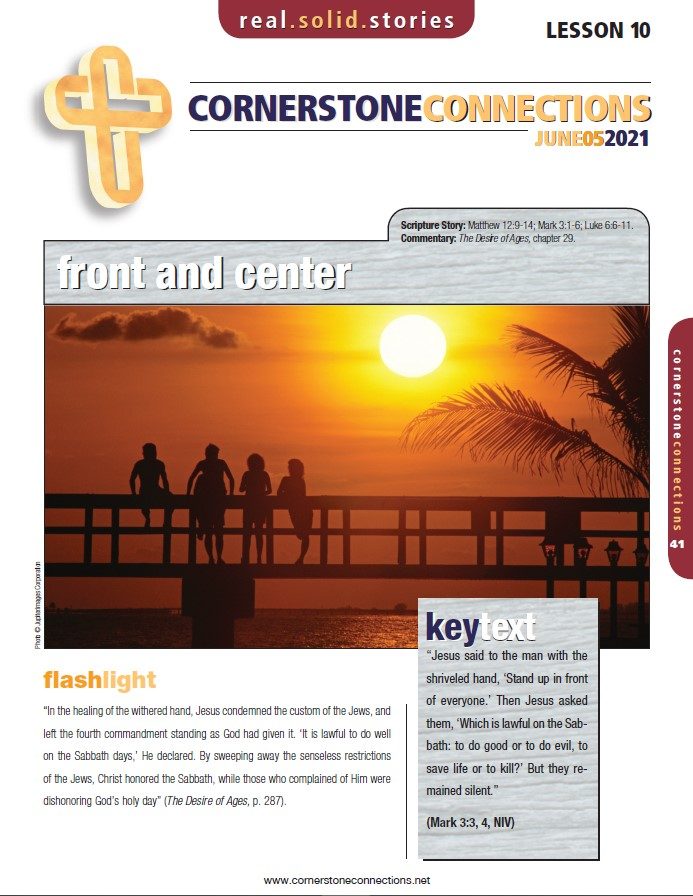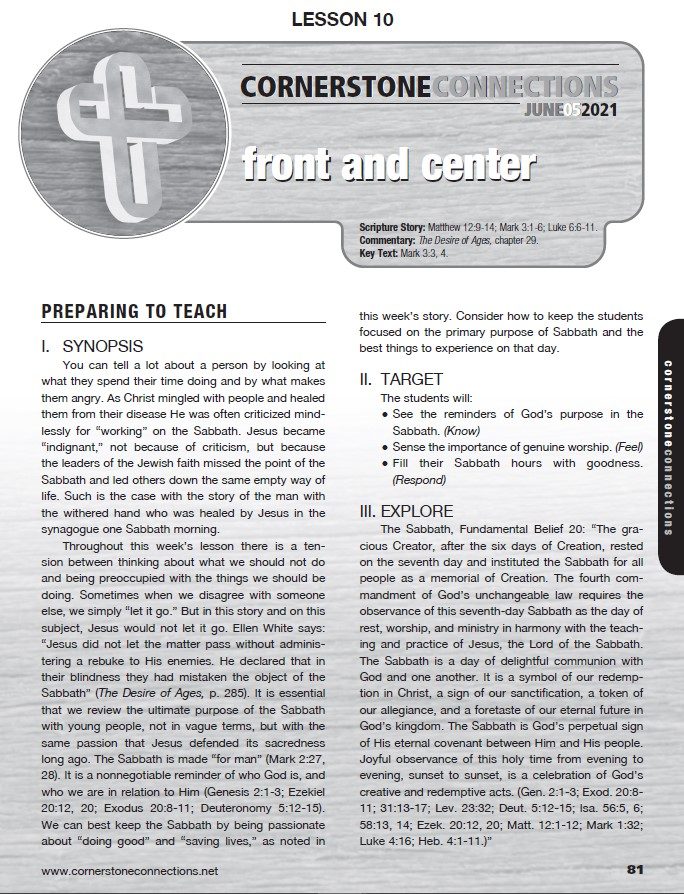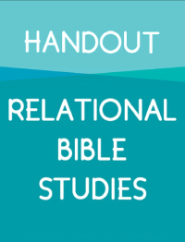Click below to download the Cornerstone Connections leader’s guide and student lesson. This week’s resources also include two lesson plans and a discussion starter video which offer different ways of looking at the topic. Each lesson plan includes opening activities, scripture passages, discussion questions, and real-life applications.
Humble Hero (Desire of Ages)
Chapter 29 - Christ Ordains Twelve Apostles

Criticism didn’t bother Jesus; He was used to it. But when the religious leaders missed the point about the Sabbath, offering His people an empty way of life, He couldn’t let it go.
Scripture Passages
Mark 3:1-6
Matthew 9:12, 13
Micah 6:8
Matthew 22:34-40
OVERVIEW
Read this week’s story in Mark 3:1-6.
1Another time Jesus went into the synagogue, and a man with a shriveled hand was there. 2 Some of them were looking for a reason to accuse Jesus, so they watched him closely to see if he would heal him on the Sabbath. 3 Jesus said to the man with the shriveled hand, “Stand up in front of everyone.”
4 Then Jesus asked them, “Which is lawful on the Sabbath: to do good or to do evil, to save life or to kill?” But they remained silent.
5 He looked around at them in anger and, deeply distressed at their stubborn hearts, said to the man, “Stretch out your hand.” He stretched it out, and his hand was completely restored. 6 Then the Pharisees went out and began to plot with the Herodians how they might kill Jesus.
SHARE: When Jesus was ministering and teaching among the people, Pharisees and religious leaders were obsessively following strict rituals and spending every moment maintaining their rigorous law-keeping. But these pious temple managers were more in the category of fancy toy cars—perfect paint jobs, shiny wheels, and all the detailed parts and features, but with no engines. The engine they needed was everything Jesus was doing and teaching about. The kingdom of God that Jesus told the people about was operated with love, justice, mercy, compassion, and freedom of choice. Keeping laws with perfect skill and precision had become the Pharisees’ only focus, but they were missing what they needed most. Coming face to face with Jesus, they saw their own inadequacies, and their hearts became filled with anger and burned with the dark desire to kill Jesus.
OPENING ACTIVITY: PUZZLE MANIA
Supplies Needed: A simple puzzle (50 pieces)
Pour out the pieces of a puzzle onto the table, but keep one piece hidden. If the group is large, then have several puzzles for small groups to work on. Simple puzzles are available at dollar stores. Ask everyone to take a few minutes to put the puzzle together. When they reach the end of the process, they will see a piece is missing. Discuss the following questions to explore the missing piece for the Pharisees in their pursuit of religion and righteousness.
QUESTIONS
TRANSITION
The Pharisees saw a man with a problem and their thoughts immediately went to how they could use the situation to accuse Jesus of wrongdoing. It is sad to think that a person who is suffering would matter so little to them. It paints a clear picture of their lack of love and compassion, the “puzzle piece” that was missing from their hearts.

BIBLE STUDY GUIDE
Read each Bible passage, then discuss the questions. If you are still worshiping from home, consider discussing one or more of the questions on social media, in a Zoom meeting, or in a group chat with friends.
Mercy, Please
Read Matthew 9:12, 13 (NIV).
12On hearing this, Jesus said, “It is not the healthy who need a doctor, but the sick. But go and learn what this means: ‘I desire mercy, not sacrifice.’ For I have not come to call the righteous, but sinners.
QUESTIONS
Called to Love Mercy
Read Micah 6:8 (NKJV).
8He has shown you, O man, what is good; And what does the Lord require of you; But to do justly, To love mercy, And to walk humbly with your God?
QUESTIONS
Share the following video to explore this set of verses more completely:
Love With All Your Heart
Read Matthew 22:34-40 (NIV).
34 Hearing that Jesus had silenced the Sadducees, the Pharisees got together. 35 One of them, an expert in the law, tested him with this question: 36 “Teacher, which is the greatest commandment in the Law?”
37 Jesus replied: “‘Love the Lord your God with all your heart and with all your soul and with all your mind.’ 38 This is the first and greatest commandment. 39 And the second is like it: ‘Love your neighbor as yourself.’ 40 All the Law and the Prophets hang on these two commandments.”
QUESTIONS
Reflection
The religious leaders had originally focused on teaching God’s laws because they wanted the people to return to the one true God. There had been a long period in history full of unfaithfulness, corruption, and idolatry. But the Pharisees had lost their focus and veered off their target. The way they treated Jesus reveals their heartless condition. Their attempts at obedience to the law reveals that the law is not enough. A religion based on rule-following is empty and even hopeless. God’s plan of salvation, after sin entered the world, never required people to keep the law perfectly to be worthy of salvation. Instead, what was required was staying close to Jesus and allowing His Spirit to transform us from the inside—from the heart. Following God’s laws was about having an abundant life filled with love from God shared with those around us. We were given the law to show what a life of following God looks like— a life full of love, good, and peace, as well as justice and mercy for everyone.

APPLICATION
Consider applying what you learned in this week’s lesson by doing one or all of these activities:
Use social media to share one of the Bible verses from today’s lesson.

SCRIPTURE PASSAGE
LEADER’S NOTE
For a Relational Bible Study (RBS) you’ll want to get into the Scripture passage and encourage the youth to imagine participating in the story while it’s happening. Then you will be able to better apply it to your own situation today.
You will need to ask God for the Holy Spirit to be present as your small group discusses the questions (no more than 3-6 people in a group is recommended). Start with the opening question. It is a personal question and the answer is unique for each individual. There is no right answer and nobody is an expert here, so don’t be surprised when you hear different responses. You are depending on the Holy Spirit to be present and to speak through your group. Say what God prompts you to say, and listen to what others share.
Take turns reading the chapter out loud. Follow that with giving the students some time to individually mark their responses to the questions (a PDF version of the handout is available as a download). This gives each person a starting point for responding when you start to share as a group. Next, begin the discussion by asking the students to share what they marked and why on each question as you work your way through. Feel free to take more time on some questions than others as discussion warrants.
Encourage each person in the group to apply what is discussed to their personal lives and to share with the group what they believe God wants them to do. Then ask them to pray that God will help each of them to follow through in doing so. Remind them to expect that God will show them ways to live out the message of this passage in the coming week, and that they are free to ask others in the group to help hold them accountable.
OVERVIEW
Right in the name “Seventh-day Adventist” is the Sabbath. In most languages, the seventh day of the week gets named “Sabbath.” While the Romans named Sabbath after their god Saturn, and while Germanic people took that name for their use, and many North Americans refer to Sabbath as Saturday, from its origins, it remains “Sabbath.”
The Jews date the original Sabbat to the creation of the world (Genesis 1:1-2:3). Before God gave the Israelites the 10 commandments at Mount Sinai, God guided His people to begin practicing Sabbath following their years of Egyptian slavery that had included no rest/Sabbath. Exodus 16 recounts the story of the “manna” and how God’s people were taught to see Sabbath as something that stood out from the rest of the days of the week.
After God’s people went into Babylonian captivity for failure to continue their committed, covenant relationship with God, those who returned after the 70 years wanted to be sure they would not desecrate the Sabbath again. So they set up all kinds of protective layers around the Sabbath. Ironically, these hedges actually kept people away from the heart of the Sabbath. Imagine setting up so many rules to protect something that you never get to actually enjoy it. That’s where the Sabbath was when Jesus came to earth.
No wonder Jesus, the Creator of heaven and earth, chose to revise their understanding and experience of Sabbath. One way He did this was to heal people on Sabbath. At that time, acts of mercy, like healing, were forbidden on the Sabbath unless it was a medical emergency. The Gospels record five of Jesus’ Sabbath healing miracles. Notice whether or not these were emergencies, as well as how public He made them so lots of people would notice.
Clearly, none of these are emergencies. Jesus seemed to purposely pick the Sabbath to heal people in these non-emergency situations. Why?
And the Greek word for “heal,” sozo, is the same Greek word for “save.” Jesus must have been giving people a new perspective of the Sabbath.
Could you use a new perspective of the Sabbath? Let this week’s Bible passage draw you into a fresh perspective and experience of Sabbath.
A Sabbath To Remember
What’s a Sabbath experience you still remember?
Read Luke 6:6-11.
6 On another Sabbath he went into the synagogue and was teaching, and a man was there whose right hand was shriveled. 7 The Pharisees and the teachers of the law were looking for a reason to accuse Jesus, so they watched him closely to see if he would heal on the Sabbath.
8 But Jesus knew what they were thinking and said to the man with the shriveled hand, “Get up and stand in front of everyone.” So he got up and stood there.
9 Then Jesus said to them, “I ask you, which is lawful on the Sabbath: to do good or to do evil, to save life or to destroy it?”
10 He looked around at them all, and then said to the man, “Stretch out your hand.” He did so, and his hand was completely restored. 11 But the Pharisees and the teachers of the law were furious and began to discuss with one another what they might do to Jesus.
1. Who was in the synagogue this particular Sabbath?
2. Why were the Pharisees at the synagogue?
3. What was the Jewish belief about Sabbath observance at that time?
4. What made this healing unusual for Jesus?
5. Is it okay to do good on the Sabbath?
6. What was the result of this Sabbath healing?
7. What good things do you do, especially on Sabbath?
8. Jesus upended that Sabbath synagogue gathering. In what way(s) has Jesus upended you and your life?
SUMMARY
We often think of Jesus as a mild and peaceful person who wouldn’t make anyone upset. We forget that religious leaders arranged for His crucifixion. Could we be so stuck in our current religious practices that we might miss what Jesus actually desires for us, including our Sabbath practices and experiences? Are you open to having Jesus upend your life the way He did for people in His day? As a Seventh-day Adventist, this might be the time to engage in the Sabbath in ways you hadn’t imagined in the past, but that Jesus is inviting you to imagine and participate in now. Check out the application options to spur some ideas for you to live this out in the coming weeks.

APPLICATION
Here are a few application ideas for you to move from Sabbath School into action this coming week and beyond. Feel free to adapt this as the Holy Spirit moves you, but, by all means, apply this Scripture study to your life in the coming week and month. There is a progression to these three ideas, but you could take them out of sequence if need be.
What has been your background regarding the Sabbath? For example, what comes to mind when you think of “Sabbath”? What practices, routines, or rituals have been part of your Sabbath experience? This might include church attendance, Sabbath School participation, going for “nature walks” on Sabbath, sleeping, having special foods or meals, or other traditions.
If Adam and Eve had just been created the day before, why did God start them with Sabbath? They hadn’t worked a day in their new lives, so what was the purpose of God giving them this rest? What would be God’s intention for Sabbath now?
God’s people, newly released from slavery with no Sabbaths, had been freed miraculously by God. After another deliverance at the Red Sea, they forgot God’s amazingly powerful miracles and began to complain against God for their current situation. God provided food each day for the rest of their time in the wilderness. Notice the practical provision and the spiritual instruction. How could/should this upend our understanding and practices today?
Take the ideas from the first application above—the four passages about the Sabbath—and engage people at your church on this topic. Preferably, choose people older than the youth, such as the parents and church elders and positive role models for the youth.




